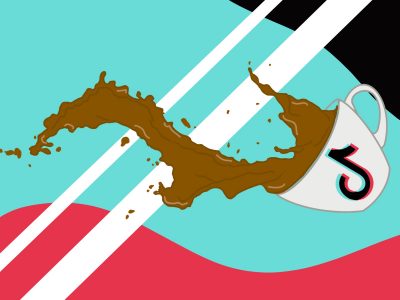Getting canceled is suddenly every influencer’s worst nightmare. The increasingly prevalent threat of cancellation means that for many public figures, a misinterpreted action or a blast from the past could tank an entire career of hard work.
But when we talk about the cancellation of celebrities, it’s important we understand what behaviors simply warrant the boycotting of content versus genuine legal action.
Not all cases of being canceled are the same, and recently it’s become more apparent than ever that a distinction needs to be made.
In May 2021, a friend of the TikTok creator Jack Wright posted a tweet which alleged Sienna Mae Gomez — former friend of Wright and fellow TikTok creator — sexually assaulted and verbally abused Wright. While James Wright — Jack Wright’s twin brother — retweeted the post and corroborated the statement — Jack himself had not yet spoken out.
Gomez denied the allegations.
Then, on Jan. 20, 2022, Wright posted a video on YouTube titled, “what sienna mae did to me.” The over 17-minute long video provided a detailed account of sexual and emotional abuse committed by Gomez, which spanned the length of year. The video included evidence of one of the many cases of sexual assault.
In response to Wright’s video, Gomez herself wrote a blog post entitled “Sienna Mae Gomez: Reflections from an 18-Year Old Me.” The post offered her account of the relationship, where she defended her actions and largely denied all that Wright had said in his video.
In one of her opening statements, she says, “Four days after turning 18, my former friend Jack Wright — the one I’ve been tangled with in a toxic web of accusations and internet ‘tea’ — posted a 17-minute video about me.” For those who are unaware, the term “tea” refers to gossip or drama. Gomez’s insinuation that a 17-minute detail of sexual abuse is “internet tea” speaks to the bizarre effect social media has had on our interpretation of serious real-world issues.
Beyond this, it is also important to draw attention to the gender bias which heavily influences how the public has treated this subject.

Toxic masculinity is the belief upheld by society that men must perform their gender in a certain way to be viewed as “real” men. It is the understanding that being a man means conforming to heteronormative subsets and often supports the suppression of emotion.
The idea that men can’t be sexually assaulted is a by-product of toxic masculinity in society. Because a man is expected to be hard, tough and strong, it is understood that men, therefore, can’t be victims of sexual assault. How can someone strong and unbreakable be violated in such an intensive manner? Especially by a woman, who under these guidelines, is inversely meant to be weak, soft, and sensitive.
Not only is it damaging to teach men there is only one way for them to be, but even conforming to these traditional ideals. The notion that sexual assault is a crime of desire committed solely by men is incorrect. Sexual assault is about power. It is a means to exert control over another who they perceive as weak thereby being of any gender does not free you from the possibility of falling victim to sexual assault.
Wright’s comment sections show the misplaced understanding of sexual assault in society. Comments which received thousands of likes insist that Wright blew the situation out of proportion and is only acting with the intention of ruining Gomez’s life.
With Wright’s experiences being invalidated due to the aforementioned beliefs of toxic masculinity upheld in our world, treating the subject as casual gossip only adds insult to injury.
The two combined create an intensely unsafe space for male victims of assault to come forward with their stories. First because of the shame which surrounds men being sexually assaulted and then, due to the impermanence of cancel culture — an added fear that their persecutors will face no consequence for their actions. It creates a space where the negatives of sharing one’s story outweigh the positives. Such ideas facilitate an incredibly lonely experience for male victims of sexual assault.
Now more than ever, we must differentiate drama from criminal action. Social media has led us to a place where it seems that the accused and the public alike are more worried about the internet’s sentence for their crimes than the sentence of an actual court of law. This is evidenced by the sexual assault allegations against Sienna Mae being treated as “internet tea” rather than potential crimes. Influencers are now more worried about their reputations than the long-term trauma caused to real people.
Sexual assault is inexcusable. While actions such as bullying, lying, or cultural insensitivity are not any more valid, people must understand the difference between another case of a canceled influencer and the detrimental and severe effects crimes like sexual assault have beyond the screen.























































































































